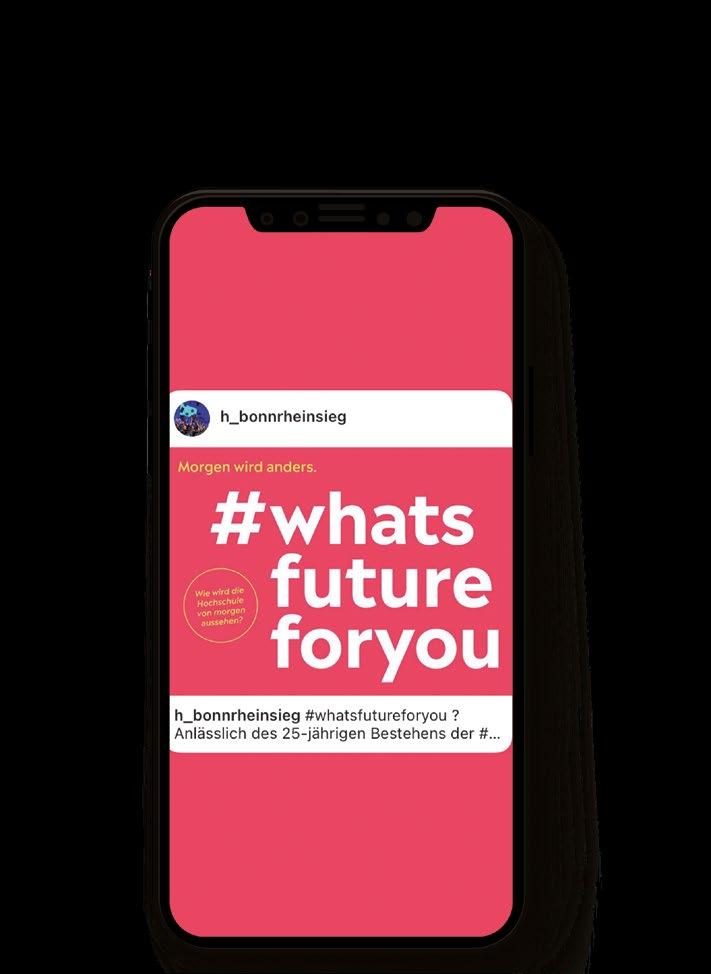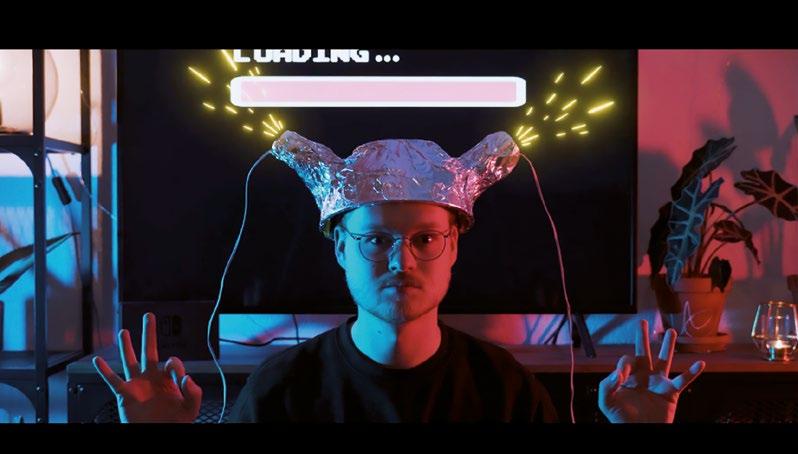
8 minute read
from University President Hartmut Ihne
The university of tomorrow
On its 25th anniversary, H-BRS asks students for future inspiration
The year 2020 has shown people more clearly than ever before how quickly things can change from one day to the next – in daily life, in the family, in studies. And this is a reason to look ahead. On the occasion of its 25th anniversary, H-BRS announced the video competition #whatsfutureforyou? Students were asked: What do you think learning and teaching will look like in the future? What will happen in the next 25 years? They were asked to answer these questions in the form of a creative and maximum three-minute video and present their very own visions of the university of tomorrow.
Visions of the future
By the end of November 2020, 25 students from various disciplines had submitted videos. They display a fascinating range of clever ideas, future scenarios and inspiration. The films are about the virtual university of the future, the university smartphone app and even the digitalised library.
The jury, comprised of University President Professor Hartmut Ihne, Lars Barth (congaz Visual Media Company), Petra Lammers (onliveline GmbH), Oliver Ruf (Professor of Communication Science at H-BRS) and Sophia Tran (DIGITAL HUB), evaluated all the entries submitted. The three main criteria were innovation, feasibility and added value for the students.
Witty and discursive
Christian Richter, a third-semester student of visual technical communication, won the competition and the prize money of 1,500 euros. “My entry showed how the targeted use of digitalisation could make daily life at the university more diverse and innovative in the future”, he says. “It was very cool to hear that I was able to convince the jury with my video.” They praised his entry as “witty and discursive, likeable and true to life”.
The second-place entry deals with the climate-neutral H-BRS of 2045, and the third-place entry proposes a university video conferencing tool. They received prizes of 1,000 and 500 euros respectively. “The competition was a complete success”, sums up jury chair Hartmut Ihne. Competition winner Christian Richter is convinced, “The university was able to gather many ideas for the future from the people who are most impacted by this topic”.
More about all entries: www.h-brs.de/whatsfutureforyou This is what the future looks like - or not? More in the winning video by Christian Richter

New Bachelor’s: Cyber Security & Privacy
Hacker attacks, Internet crime, cryptocurrency – the digital transformation brings a lot of benefits, but also dangers and challenges. For this reason, the Ministry of Culture and Science NRW launched the Cyber Campus NRW project in 2020. Both H-BRS and Hochschule Niederrhein are participating (for more information, please see the chapter “research”). The project started in winter semester 2020/21 with the degree programme in Cyber Security integrated into the Bachelor of Computer Science. In winter semester 2021/22, the now independent Bachelor’s programme Cyber Security & Privacy will launch. The focus will be on web and application security, cloud security, malware analysis and IT forensics. The long-term goal is to train students to become highly specialised experts for business and public institutions.
The Bachelor’s programme Sustainable Social Policy is a mix of sociology, management sciences, political science, law and communication studies. This makes it extremely popular with students. Three aspects are emphasised again and again: the variety of disciplines, the high level of practical relevance and the diversity of the programme’s content. “The interdisciplinarity is unique and the implementation brilliant”, says Philipp Jochmann from class intake 2017 enthusiastically. The integrated practical semester and the strong connection to professional life are also well received by the students. Possible future employers range from NGOs and federal ministries to trade union associations. The versatile orientation makes the subject unique. As Mirjeta Rama sums up, “We students are offered a rich variety that is rarely found in a single degree programme”.
Teaching Databases – EILD
To help universities expand their digital infrastructure, the NRW Ministry of Science has been funding projects for innovative teaching and learning formats since 2020. H-BRS is involved in several projects, including “Development of Content for Teaching Databases in Diverse Learning Scenarios” (EILD). The working group, which also includes TH Cologne, FH Dortmund and Hochschule Düsseldorf, wants to jointly develop content for teaching via databases within two years. The most important aspect of the project is that the concepts are to be freely accessible to all. This way, the teaching content can be flexibly adapted to the degree programmes in management sciences, medicine and digital media. Students have an important role to play in this as they are to evaluate the content developed.
Brazilian students experiment in the Remote Lab
International students in particular benefit from the digital expertise of Hochschule Bonn-Rhein-Sieg. Brazilian partner university Universidade Católica de Pelotas has been using the FPGA Remote Lab developed by Professor Marco Winzker in Sankt Augustin since summer 2020. With the help of the online lab, Brazilian students in the Computer Engineering programme can conduct experiments from their own laptops. Their results are sent to the lab at the Sankt Augustin campus. In addition, Winzker’s supplementary instructional videos have been translated into Portuguese. FPGA stands for “Field-Programmable Gate Array” and refers to an integrated circuit in digital technology. Students can design their own digital circuit via the Remote Lab.
How online teaching succeeds
The digitalisation of teaching is advancing – H-BRS is well-positioned
The phrase “broaden your horizons” is recommended for many areas of life. And it applies more than ever to teaching and learning at institutes of higher education. In the course of digitalisation, the trend is moving further and further from the familiar to new patterns of action. Computer-based teaching and learning methods as well as virtual seminar rooms are becoming part of daily university life. Hochschule Bonn-Rhein-Sieg has been a pioneer in this field for years and was already working with online teaching and online lab experiments long before the Corona pandemic hit. The year 2020 was also marked by digitalisation. An overview.
Funding programme for data literacy
The proper handling of large amounts of data and statistical skills is what the funding programme “Data Literacy Education.nrw” by the Ministry of Culture and Science NRW, the Digital University of North Rhine-Westphalia and the Donors’ Association is all about. The aim is to teach data literacy to students throughout NRW. All universities could apply with their own teaching and learning concepts. Only ten – including H-BRS – were selected, and each will receive up to 300,000 euros from the ministry.
Consortium on Digital Teaching
Competences are also to be imparted to teachers. Under the project name HD@DH.nrw, H-BRS and eleven other institutes of higher education from NRW joined forces in August 2020 to sustainably strengthen the digital competence of teachers. Under the leadership of the University of Siegen and FH Aachen University of Applied Sciences, the partners want to combine their respective focal points. The aim is to create a space in which each can learn from the other, new digital didactic concepts are developed and teachers acquire additional digital skills. The joint project is initially scheduled to run for four years and complements the Centre for Innovation and Development in Teaching’s (ZIEL) opportunities for teachers to acquire further training in higher education didactics.
Emergency Remote Teaching
As a result of the Corona pandemic in 2020, higher education everywhere had to be transferred abruptly to digital teaching platforms. Thanks to years of experience with digital teaching, H-BRS managed this shift smoothly. The Institute for IT Service (ITS) expanded the systems at short notice to meet the demand for increased capacity. “If you look at the difficult conditions, it worked out wonderfully for us overall”, says Professor Marco Winzker, Vice President for Teaching, Learning and Further Education. “What helped us most was our learning management system LEA, thanks to which we were very well prepared.” This set wheels turning. “Using LEA, we set up options such as a forum for teachers where they could exchange questions and approaches to digital teaching”, says Susanne Kundmüller-Bianchini from the library’s e-learning team. She and her colleagues have provided a lot of support in transitioning teaching to the digital world. “We were a sort of first aid hotline at times and in constant contact with the teachers. That was intense, but also nice”, she remembers looking back. The “Digital Compass”, a platform for teachers to exchange experiences and ideas about e-learning, which had already been introduced in 2019, was suddenly all the more helpful, too. “Online teaching is possible! It doesn’t have to be anonymous and impersonal. Communication and interaction in the digital classroom work”, Kundmüller-Bianchini sums up.
The students also have positive things to say. “I thought that the digital courses were successful. The majority of the lecturers were confident in their use of technology and placed a strong emphasis on interaction, especially in the block lessons”, reports Eva Ewerhart, a student of business psychology in her eighth semester. Digital competence is already taken into consideration when appointing lecturers, says Winzker. “That has become standard practice. Didactic planning competence still shows room for improvement – what can I do online and what can I do in class?”
Lecturers report
And what do the lecturers say? “I noticed that you don’t get much feedback online, especially with synchronous learning. On the other hand, I was positively surprised at how well the digital synchronous teaching with screen sharing and breakout sessions was received”, says Professor Robert Grüter from the Department of Management Sciences. Andrea Schröder, lecturer in civil law and a member of ZIEL’s three-person directorate, sums up, “Our biggest concern was how to create a motivating learning atmosphere even with large numbers of participants. But the response was thoroughly positive. All students felt comfortable and found the learning climate constructive.”
Last but not least, the new teaching mission statement (Leitbild Lehre) adopted in July 2020 emphasises the forward-looking orientation of H-BRS. It states that teaching methods and concepts must “continuously be reflected upon and evaluated in order to refine them in response to requirements”.

More:
Digital University NRW: www.dh.nrw
Teaching Mission Statement: www.h-brs.de/leitbild-lehre-der-hochschule-bonn-rhein-sieg Digital Teaching Compass: www.h-brs.de/ziel/kompass-digitale-lehre










